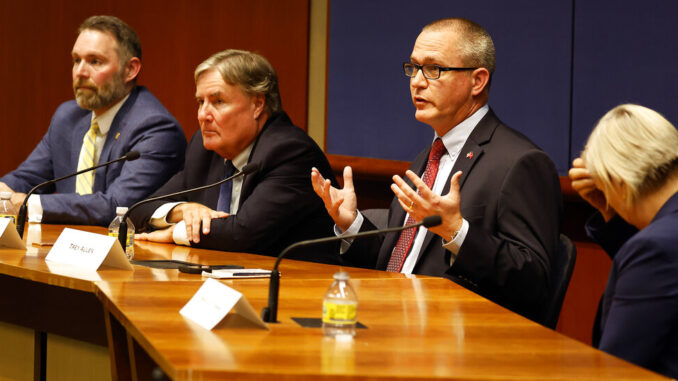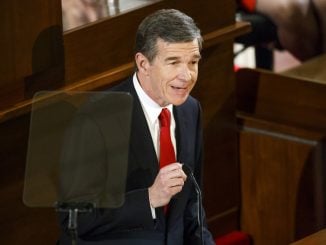
RALEIGH — An attorney representing voters accused of fraud in the 2016 election warned the state’s highest court that their eventual decision could allow political operatives to make voter fraud allegations without consequence — but the justices had several questions.
The North Carolina Supreme Court heard oral arguments last Thursday for Bouvier v. Porter — a civil suit centered around four voters from Guilford and Brunswick counties who allege they were defamed by supporters of former Gov. Pat McCrory after the 2016 election. The panel of five justices considering the case were all Republicans after the court’s two Democrats recused themselves for previously representing the plaintiffs.
Both sides underwent a barrage of questioning from the judges panel during the 50-minute hearing, although most inquiries — and sometimes outright disagreements — fell on the plaintiffs.
As is usual, the court didn’t immediately rule. It’s not clear if the case, which discusses voter fraud allegations, will be decided before the 2024 election, according to plaintiff attorney Jeff Loperfido. The decision will not determine if the plaintiffs were defamed but rather whether the defendants had certain immunities to make their claims.
Soon after what became a narrow win for Democratic Gov. Roy Cooper in 2016, supporters of his opponent, the incumbent McCrory, filed election protest petitions declaring voting irregularities had occurred, including accusations from Greensboro Republican official William Porter. The petitions, which were also filed in Brunswick County, alleged the plaintiffs had voted twice, according to their 2017 lawsuit.
Porter’s petition against three Guilford voters was dismissed for “lack of any evidence presented” and one protest in Brunswick County was withdrawn, according to an appeals court opinion.
The case was sent up to the state Supreme Court after an appeals court gave plaintiffs a partial victory in 2021. It decided Porter had absolute privilege while the other defendants — the law firm Holtzman Vogel Josefiak Torchinsky and the Pat McCrory Committee Legal Defense Fund among them — did not.
Absolute privilege is a legal term used in defamation cases to outline circumstances where someone is shielded from liability for potentially defamatory statements. The privilege is typically granted in judicial and legislative proceedings.
Craig Schauer, a defense attorney, said during Thursday’s hearing that the defendants did fulfill a role that would give them absolute privilege, albeit in a more informal setting than typical judicial proceedings. By ruling against the defense, Schauer said the court’s precedent would hinder people from voicing their concerns with the election process.
“It’s unprecedented. It’s undefined. It’s unnecessary. It’s actually based on a legal fiction, and it’s going to result in unwanted consequences,” he said.
An attorney representing the plaintiffs, Press Millen, urged the court to uphold the appellate decision. Absolute privilege is something earned and not given “willy-nilly,” he said, and the defendants were not true participants during the election protest filing.
“This court will be creating a group, a creature, who is entirely able to act with impunity in the context of judicial and quasi-judicial proceedings without being lawyers, witnesses or parties,” Millen said.
Several of the justices, including Tamara Barringer, Trey Allen and Chief Justice Paul Newby, raised issues with the plaintiff’s arguments, citing concerns about how broad the scope of who doesn’t have absolute privilege. A few times during the hearing, Justice Richard Dietz told the plaintiffs they “just brought the wrong claims” to argue to the court.
“This could have been any losing candidate’s campaign effort to try to create enough smoke to delay certification or try to encourage the state board of election to review these protests in a certain way,” Loperfido said before the hearing.
Schauer didn’t immediately respond to an email after Thursday’s arguments seeking comment.
Louis Bouvier, the lead plaintiff, told The Associated Press after the arguments that he was disappointed in the justices’ questioning because, to him, it’s a “simple issue.” The case results are more important today than seven years ago when the lawsuit was filed because of “the mood of the country and politics,” Bouvier said.
“2016 and now, it’s like, earth-shatteringly different,” he said after the hearing.



